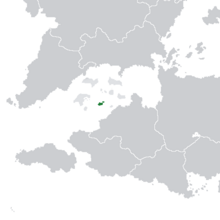Papotement: Difference between revisions
mNo edit summary |
mNo edit summary |
||
| Line 1: | Line 1: | ||
[[Category:Carucere]][[Category:Languages]] | [[Category:Carucere]][[Category:Languages]] | ||
{{Infobox language | {{Infobox language | ||
| name = Papotement | | name = ''Papotement'' | ||
| nativename = Kréol Karukais | | nativename = ''Kréol Karukais'' | ||
| states = | | states = | ||
| nation = [[Carucere]] | | nation = [[Carucere]] | ||
| speakers = | | speakers = ~600,000 | ||
| script = {{wp|Latin script|Solarian}} | | script = {{wp|Latin script|Solarian}} | ||
| familycolor = Creole | | familycolor = Creole | ||
| Line 19: | Line 19: | ||
| mapcaption = Location map of Carucere, where Parlerment is spoken | | mapcaption = Location map of Carucere, where Parlerment is spoken | ||
}} | }} | ||
'''Papotement''' or '''Carucerean Creole''' (Papotement: ''Kréol Karukais''), is a Gaullican-based {{wp|creole language}} spoken in | '''Papotement''' or '''Carucerean Creole''' (Papotement: ''Kréol Karukais''), is a {{wp|French language|Gaullican}}-based {{wp|creole language}} spoken by over 600,000 people in the Asterians. It is the most widely spoken language in [[Carucere]], where it is one of two official languages of the country, the other being {{wp|French language|Gaullican}}. | ||
Papotement is largely based on colonization-era {{wp|French language|Gaullican}}, but its grammar resembles several East Bahian languages, such as {{wp|Shona language|veRwizi}}. The language has been considerably influenced by [[Ziba|Ziban]] since the 19th century, which introduced new words and pronunciations. It also has been influenced by Estermish, Nati, and other East Bahian languages. It is not mutually intelligible with standard Gaullican, and has its own distinctive grammar. | |||
Papotement is the {{wp|lingua franca|lingua gaullica}} of the Republic of Carucere, which gained independence in 1954. Carucereans tend to speak Papotement and in media and Gaullican primarily for administration and educational purposes. Though Carucereans are of numerous ethnic origins, including Southeast Coian, Bahian, and Euclean; Papotement has gradually replaced the ancestral languages of most the population to become the primary home language of the country. | |||
==Etymology== | ==Etymology== | ||
The word ''Papotement'' originates from ''papote'', from Gaullican ''papoter'' ("to chat, chatter"), added by the noun-forming suffix ''-ment''. The word is ultimately derived from a colloquial term by Euclean settlers to refer to the language spoken by Bahian slaves. | |||
==Origins== | ==Origins== | ||
==History== | ==History== | ||
Revision as of 16:52, 31 August 2022
| Papotement | |
|---|---|
| Kréol Karukais | |
Native speakers | ~600,000 |
Gaullican-based creole languages
| |
| Solarian | |
| Official status | |
Official language in | Carucere |
| Language codes | |
| ISO 639-3 | Par |
 Location map of Carucere, where Parlerment is spoken | |
Papotement or Carucerean Creole (Papotement: Kréol Karukais), is a Gaullican-based creole language spoken by over 600,000 people in the Asterians. It is the most widely spoken language in Carucere, where it is one of two official languages of the country, the other being Gaullican.
Papotement is largely based on colonization-era Gaullican, but its grammar resembles several East Bahian languages, such as veRwizi. The language has been considerably influenced by Ziban since the 19th century, which introduced new words and pronunciations. It also has been influenced by Estermish, Nati, and other East Bahian languages. It is not mutually intelligible with standard Gaullican, and has its own distinctive grammar.
Papotement is the lingua gaullica of the Republic of Carucere, which gained independence in 1954. Carucereans tend to speak Papotement and in media and Gaullican primarily for administration and educational purposes. Though Carucereans are of numerous ethnic origins, including Southeast Coian, Bahian, and Euclean; Papotement has gradually replaced the ancestral languages of most the population to become the primary home language of the country.
Etymology
The word Papotement originates from papote, from Gaullican papoter ("to chat, chatter"), added by the noun-forming suffix -ment. The word is ultimately derived from a colloquial term by Euclean settlers to refer to the language spoken by Bahian slaves.